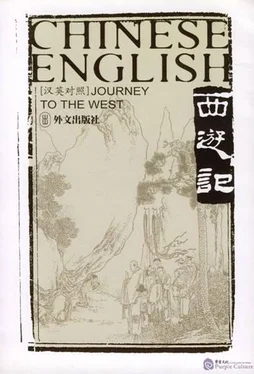“There is a saying, abbot,” replied Sanzang, “that 'Buddhist and Taoist monasteries and convents are all rest-houses for us monks; the sight of the temple gate is worth a big helping of rice.' You can't refuse us. What do you mean by it?”
“You wandering monks,” roared the abbot in fury, “you've all got the gift of the gab, haven't you?”
“Why do you say that?” asked Sanzang, to which the abbot replied, “There's an old saying that goes,
When the tiger came to town,
Every household shut its door.
Although he'd bitten no one yet,
Tiger's name was bad before.”
“What do you mean, 'Tiger's name was bad before?'“ asked Sanzang.
“Some years ago,” the other replied, “a group of itinerant monks came and sat down at our gates. Seeing how wretched they were-their clothes all torn, barefoot and bareheaded-I was sorry for them being so ragged. So I asked them into my quarters, gave them the best places to sit, provided them with a meal, lent each of them an old habit, and let them stay for a few days. Little did I imagine that the free food and the free clothing would put all thought of leaving out of their minds. They stayed for seven or eight years. Staying wasn't so bad, but it was all the terrible things they did.”
“What terrible things?” asked Sanzang. “Listen while I tell you,” replied the abbot,
“When idle or bored they threw bricks around,
Or tore out the studs from the monastery walls.
On cold days they burnt all the window-frames up,
Slept outside in summer on dismantled doors.
“They ripped up the banners to make themselves foot-cloths,
Traded our incense and ivory for turnips,
Stole oil from the lamp that never goes out,
And gambled away all our cauldrons and dishes.”
“Oh dear,” thought Sanzang on hearing this, “I'm not a spineless monk like them.” He was on the point of tears, but then thought that the abbot might mock him, so he discreetly dried them with his clothes, held back his sobs, and hurried out to see his three disciples.
At the sigh of his master's angry expression Monkey asked him, “Master, did the monks in there beat you up?”
“No,” replied Sanzang.
“They must have,” said Monkey, “or why else did I hear sobbing? Did they tell you off?”
“No,” said Sanzang. “They did not tell me off.”
“If they didn't beat you or reproach you, why look so upset?” asked Monkey. “Don't tell me it's because you're homesick.”
“This is not a good place,” said the Tang Priest.
“They must be Taoists here,” said Monkey with a grin.
“You only get Taoists in a Taoist temple,” retorted Sanzang angrily. “In a Buddhist monastery there are Buddhist monks.”
“You're hopeless,” said Monkey. “If they're Buddhist monks they're like us. As the saying goes, 'All in the Buddhist community are friends.' You sit here while I take a look around.”
The splendid Monkey touched the gold band round his head, tightened his kilt, went straight into the main shrine-hall, pointed at the three Buddha statues and said, “You may only be imitations made of gilded clay, but you must have some feeling inside. I'm here this evening to ask for a night's lodging because I'm escorting the holy Tang Priest to worship the Buddha and fetch the scriptures in the Western Heaven. Announce us this instant. If you don't put us up for the night I'll smash you gilded bodies with one crack of this cudgel and show you up for the dirt that you really are.”
While Monkey was indulging in this bad temper and bluster a lay brother responsible for burning the evening incense had lit several sticks and was putting them into the burner in front of the Buddhas. An angry shout from Monkey gave him such a fright that he fell over. Picking himself up he saw Monkey's face, at which he collapsed again, then rolled and staggered to the abbot's cell, where he reported, “Reverend sir, there's a monk outside.”
“You lay brothers really need more flogging,” said the abbot. “I've already said they can squat under the eaves, so why report again? Next time it will be twenty strokes.”
“But, reverend sir,” said the lay brother, “this is a different monk. He looks thoroughly vicious, and he's got no backbone either.”
“What's he like?” the abbot asked.
“Round eyes, pointed ears, hair all over his cheeks, and a face as ugly as a thunder god,” said the lay brother. “He's got a cudgel in his hand and he's gnashing his teeth in fury. He must be looking for someone to kill.”
“I'll go out and see him,” said the abbot. No sooner had he opened his door than Monkey charged in. He really was ugly: an irregular, knobbly face, a pair of yellow eyes, a bulging forehead, and teeth jutting out. He was like a crab, with flesh on the inside and bone on the outside. The old monk was so frightened that he fastened the doors of his quarters.
Monkey, who was right behind him, smashed through the doors and said, “Hurry up and sweep out a thousand nice clean rooms for me. I want to go to sleep.”
The abbot, hiding in his room, said to the lay brother, “It's not his fault he's so ugly. He's just talking big to make up for that face. There are only three hundred rooms in the whole monastery, even counting my lodgings, the Buddha Hall, the drum and bell towers and the cloisters, but he's asking for a thousand to sleep in. We can't possibly get them.”
“Reverend sir,” said the lay brother, “I'm terrified. You had better answer him, however you will.”
“Venerable sir,” called the abbot, shaking with fear, “you ask for lodging, but our little monastery would be most inconvenient, so we won't be able to entertain you. Please spend the night somewhere else.”
Monkey made his cudgel as thick as a rice-bowl and stood it on its end in the courtyard outside the abbot's cell. “If it would be inconvenient, monk,” he said, “you'd better move out.”
“But I've lived here since I was a boy,” the abbot said, “my master's master passed the monastery on to my master, who passed it on to my generation, and we'll hand it on in turn to our successors and our successors' successors. Goodness only knows what he's up to, charging in here and trying to move us out.”
“No problem at all, reverend sir,” said the lay brother. “We can go. He's already brought his pole into the yard.”
“Stop talking nonsense,” said the abbot. “There are four of five hundred of us monks, old and young, so where could we go? If we went there would be nowhere for us to stay.”
“If there's nowhere you can move to,” said Monkey, who had heard the conversation, “you'll have to send someone out to take me on in a quarterstaff fight.”
“Go out and fight him for me,” the abbot ordered the lay brother.
“Reverend Sir,” the lay brother protested, “you can't ask me to fight with a staff against a caber that size.”
“You must,” the abbot replied, adding, “'An army is built up for many years to be used in a single morning.'”
“Never mind him hitting you with that caber,” said the lay brother, “it would squash you flat if it just fell on you.”
“And even if it didn't fall on you and squash you,” said the abbot, “with it standing out there in the yard you might be walking around at night, forget it was there, and give yourself a dent in the head just by bumping into it.”
“Now you realize how heavy it is, reverend sir, how can you expect me to go out and fight him with my staff?” said the lay brother. This was how the monks quarreled among themselves.
“Yes,” said Monkey, hearing all this, “you're no match for me. But if I were to kill just one of you with this cudgel my master would be angry with me for committing murder again. I'd better find something else to hit as a demonstration for you.” Looking and seeing a stone lion outside the doors to the abbot's room, he raised his cudgel and smashed it to smithereens with a single resounding blow. When the abbot saw this through the window the fright turned his bones and muscles to jelly. He dived under the bed.
Читать дальше









